- Home
- J. -H. Rosny aîné
Vamireh Page 14
Vamireh Read online
Page 14
It was impossible to swim. Swinging from one piling to the next, the blonde girl moved forward laboriously. She touched soft and repulsive algae extended along the wood; bats escaped through a loophole; alarmed fish made the water seethe and stirred up wakes of pale fire where they passed through the light.
At the densest part of the colonnade, Eyrimah hesitated; she could no longer see any but rectangular windows of light, the tunnels of subterranean animals everywhere, ominous and confused, pilings like twigs of undergrowth, and a few mollusks overhead, like flower-heads. Her bare arm, abruptly striped with light, looked like some marvelous serpent, and the heavy curtains of the splashing waves, breaking on her upper body, wrapped a cold embrace around her slim legs, the figure beloved by In-Kelg.
She ended up reaching the underside of a street, where a broader tunnel extended, illuminated in the distance by a tiny blue rectangle. There she could swim, her slender hands supported on the surface, her feet pushing her along silently. The beams of moonlight, more numerous, enveloped her in a mobile pattern, picking out her pale eyes within the pallor of her hair. The water seemed to be sloping upwards toward the lunar rectangle, which grew larger with every stroke. A dull plaint, like the sound of snoring, emerged from the confused pilings with the splash of a wave thrown from one space to the next.
Eyrimah was frightened, though, for footfalls were audible on the latticework overhead. She feared that it might be Ver-Skag. She caught hold of the nearest piling and waited.
The Moon must be close to its zenith now, for its brightness was visible on the lake, but scarcely extended into the tunnel through the rectangle, while it projected rigid sheets through a number of slits, which the water broke up with its ebb and flow. A breeze got up between the pilings. The waves broke into a thousand facets, in which the rays danced, as agile as aquatic insects on the tide. The lacustrian cave, the grotto of the stalactites, was reminiscent of a hearth on a winter’s day, when wasp-like sparks fly from the desiccated twigs.
The child’s heart was beating in her breast like Oceanic waves. As savage as a she-wolf, undiminishable by anything, as swollen as a storm that will not burst, the instinct of modesty circumscribed her life. She had no fear other than that of recapture and rape; rather than surrender she would have let go of her pillar and drowned herself.
The running footfalls stopped. A shadow was projected over the edge of the tunnel; a body hung down. Hidden among the pilings, Eyrimah heard oars, and then saw a boat. She thought that it might be some merchant on his way to another village, and she resumed her progress silently, reaching the opening.
Already some distance away, the vessel was moving through the moonlight. The lake was splashing abundantly, the blades racing through the water, and then emerging slowly; the pure light, quivering, caused the long trail of moonlight established in its wake to vibrate in zigzags.
She got her bearings. She was opposite the bridges, where no watchman was stationed during the night. Considerable numbers of solidly-moored boats were oscillating in the waves. At first, she thought about taking one and reaching the shore by that means, but Ver-Skag might be on the lookout; he would surely see the boat and catch up with it. She therefore resolved to swim away, and let go of the pilings, sad to be leaving the wooden islet where she had spent her childhood, and especially sad to be going far away from In-Kelg.
Fatigue paralyzed her arms in the colder open water. The waves hampered her; her head scarcely emerged, rolling in the folds of the waves; her wet hair was plastered over her face, shoulders and arms. The reflected image of the Moon fled into the distance. She kept her eyes on it, and followed it. Small and delicate wrinkles were crumpling the image like a supple fabric. Outside the furrow ploughed by the star, the lake was dark, like molten tin seen from an angle, while the shores seemed as blonde as Eyrimah’s hair.
Weary and imperiled as she was, she loved the grace of the trees, where clear droplets seemed to be cascading; she thought about the gray trunks of linden-trees, rough and warm, where she might place her crumpled hands. She swam more rapidly, her frail body gliding through the water, while her head protruded a little further—but a hint of fever reddened her cheeks; the shore seemed terribly distant.
She felt a desire to rest her head on the waves and go to sleep, for her arms were numb and she was having difficulty breathing—but for five more minutes her muscles sustained her. Then her little fingers opened, and her mouth skimmed the level of the lake, going under. She struggled for another minute, desperate to reach the shore, and then she sank and disappeared, only her hair remaining afloat, like long algal fronds.
Under the water, however, instinct reanimated her. She stiffened, and swam on her back, almost without difficulty—and as her ears were exposed, she heard a voice drifting through the rumor of the wind.
“Eyrimah!”
She recognized Ver-Skag’s voice, as raucous as a voice of stone—and then another voice, young and clear, like the voice of a spring, also called her name. She was glad that it was In-Kelg, but she was afraid for him. She regained her strength. Her arms ploughed through the distance that separated her from the shore, hid her wet body in a crease of the bank, and gazed at the village where the two men had their backs to her.
Soon, the night was disturbed by a dispute. Clenching her teeth, the girl from the North saw fists raised, a mime of combat—and then a third person, thickset and enormous, intervened. She knew that it was In-Kelg’s father, and heard the giant threatening Ver-Skag. No longer afraid, she rejoiced as she followed the scene with feminine malice. After two minutes of quarrelling, the colossus hurled himself upon his adversary; the body of Ver-Skag was thrown into the lake, and then the victor drew his son imperiously back to the village.
Eyrimah remained where she was, scrutinizing the darkness, anxious to find out what had become of Ver-Skag. Soon, a black head appeared on the surface, drifting toward the pilings. Eyrimah was not entirely displeased by that. She recalled her common life with the chief, tenderly. She was glad that he was alive. She had the great resignation of virgins, the desire for sacrifice.
Fearful of the watchmen, she crawled through the thick grass and reached the trees. Beneath their cover, she was no longer so cold. Although she had eaten as usual, her adventure had made her hungry; on the other hand, she had no desire to sleep. She therefore resolved to march until she discovered some thicket or rock in which her experience signaled the presence of eggs. First, she wrung out her meager linden-fiber tunic; then, drier and somewhat rested, she set out.
The Moon was going down, growing as it sank and less pale; the Earth had a melancholy thrill, as if the lazy night were stretching itself, sure of its morning.
There was nothing but long climbs and short descents in the ever-lengthening shadows and the bluish pallor of the moonlight; then she stopped in front of an opening near the top of a rock, where thistles grew and from which tumbled the tangled tresses of wild vines. It was almost inaccessible, the rock-face being steep and arid, but Eyrimah, sure of discovering eggs there and perhaps capturing some bird, felt herself attracted to the hole as to a gulf. She therefore climbed up to the summit, and then looked down. Her entrails were crying out. Ardent life claimed recompense and effort, new blood. She sought in vain for another place where there might be nourishment. There was fleecy grass everywhere, the lacustrians’ carefully-protected meadows, already invaded by their flocks.
Before her hunger-enlarged eyes the night was hallucinatory: the resplendent bowl, the pearly disk where mist trembled; the vast Earth invaded by sheets of darkness; the lacustrian dwellings on the great lake; the wavelets reminiscent of the undersides of linden-leaves; and the voice of life a prodigious flux within her.
She leaned over; the tresses of the vine fell gently, intimately. It seemed impossible to her that things might be insidious, and only the vertigo that retains young animals still gave her pause. Finally decisive, she suspended herself from the rock—but then she became frightened of falling
, sensing the void beneath her feet. She remained still for some time; then, wearying, she gave in. Her fingers opened, and she fell the length of the declivity. Fortunately, the upper part of the opening overhung; her body overshot; only her head and upper body intruded into it to some extent. When she touched the vine she gripped it hard, with grim instinct, thus slowing down and eventually stopping her fall. By hoisting herself up a little, she moved into the hole and wriggled inside it.
A confused joy overwhelmed her, of safety attained and audacity rewarded. At the back of the hole her fingers encountered warm feathers. A bird struggled violently, and escaped through the opening, followed by a second. Eyrimah regretted the lost prey, but was consoled by finding a small heap of eggs, which she recognized as fresh. She ate them immediately; then, satisfied, she curled up in her little niche and went to sleep.
She awoke at dawn. She remained motionless at first, numbed by cold, looking out over the landscape. The Moon was like a little round cloud, about to disappear. The daylight was rising in the far distance, down below, behind the trees, in a faint dust the color of forget-me-nots—which made the lake into a white-bordered hole, while darkness and mist were still consuming everything else.
Putting her head out of the hole, she studied the rock. She found that she was a long way up. The smooth stone below offered no escape. She could not think of going back up. Initially despairing at the idea of dying of hunger in the hole or breaking her bones in a fall, she ended up discovering a narrow ledge contiguous with the threshold of the opening. A hundred meters away, that ledge reached the lateral slope of the rock, which was not sheer. Hanging on as best she could to projections, and plunging her convulsive fingers into cracks, she made her way along the ledge, tormented by the sensation of falling backwards. She made her escape, though, proud and full of the joys of the rising dawn, which was trembling over the mountains and the lake.
Within the broadened horizon, 50 villages were visible over an extent of about two hours’ march; the remainder were lost in the mist, along with the water. She observed an unaccustomed movement of boats between the villages and the villages on the shore. Directly beneath her, at the place where a stream departed from the lake and where the principal township stood, the boats were massing as in times of war.
Fearful for In-Kelg, whom she knew to be reckless, she retained the hope that it might be a fishing dispute, an argument between two neighboring villages, or that, even if it was a war, the adolescents would not take up arms. As she continued walking, however, she arrived in the vicinity of a meadow and saw that the livestock had been reassembled during the night, and were already descending toward the lake—with the result that she found herself in a deserted region, save for a few old horses, a few sick cows and a few capricious goats that had fled from the herdsmen. Then she became sad, thinking about the distant island and the boats. There was a slow procession of boats through the light mist, like a flotilla of ducks. She watched for some time. Finally, the bluish mist lifted, melting into the sky. Eyrimah saw the signal of the lacustrians’ Grand Council, and understood that it was war, and wept. That did not, however, diminish her fear of Ver-Skag, nor persuade her to return to her old life.
When she finished weeping, she felt hungry. With a few agile bounds she caught a she-goat with dangling teats and drank for a long time. Satiated and restored, she laughed at the Sun and the mountains. Her intoxicated young blood swelled in her veins, making her light-headed. She was like a goat-kid in love with peril; she marched through the gullies and the rubble of landslides caused by bad weather. Savagely, she savored the gulfs, the clefts and vertiginous declivities. The soul of the mountain was within her, its rough and complex life, the shadow of its damp gorges, the dry wind of the plateau, and the pride of the stone that time carves and hollows out, dying slowly in its beauty, more profound every day.
Soon she reached the neutral zone that separated the mountains from the lake-dwellers’ territory. The memories of her early childhood were vibrant within her, confused but moving. She was dazed by a joy of savage freedom. Bounding ibex or chamois disappeared amid the rocks, and sometimes a slender animal would pause, gazing at the frail girl for a long time.
The mountain quivered beneath the midday Sun. Eyrimah, sheltered by a rock whose foliage extended a delicate fleecy shade, went to sleep for a couple of hours.
When she woke up again, she had an impression of the grace of things as tangled as the brambles along her route, but profound and prodigious. She had a sensation of grandeur among the shapes, of inhabiting a god larger than the one of the lacustrians; she leaned her little trembling soul over the edge of the nature in which she had the splendor to be.
She crossed the region of the plateau. All around, wheat, barley and rye were sown on suitable ground. Dogwood, cherry-trees and wild plums were disseminated through the fields. Pear-trees and apple-trees, already improved, were grouped in primitive orchards. All the nourishment of the villages of Re-Alg was there: the oak plantations productive of sweet acorns; the hazelnut-trees, the pines whose oily and resinous nuts were eaten, the yew-trees, the raspberries, the mulberries whose fermented juice dispensed drunkenness.
Asiatic cattle, mingled with indigenous urus, sheep and goats were grazing the meadow-grass. At that time, the urus and the aurochs, retreating to the forests, were beginning to decrease in confrontation with humans; the wild boar had surrendered, transformed by captivity into pigs; the lion, the leopard and Felis spelaea, fleeing from the active race that tracked them, had reached India or Siberia, while the mammoth, the reindeer and the wapiti lived among the beeches of the North.
She marched until dusk, losing herself in blind pathways. Through the maze of the mountains, by deceptive trails and dry stream-beds suddenly terminated by an immense waterfall, her weary young flesh discovered the terrible charm of the eternal effort of the eternal journey, and the patience of the ant, along with the courageous anxiety of the migratory nightingale and the obstinacy of salmon going upstream.
In the afternoon, the sky became covered with low clouds, which soon deprived the valley of sunlight. She was at a considerable altitude, alone with the bears and the chamois. The warm and humid wind whipped her gently, her hair streaming behind her or returning to slap her cheeks, and its breath bathed her face in a powerful dream, sending all chagrin to sleep.
When the Sun set behind the clouds, the eternal chimera was ignited by the false mountains and the immense strands, its gleams transformed into devouring fires; then, as flowers of light blossomed, with naked petals of green and orange, Eyrimah stopped climbing. She installed herself on a high ledge, the only convenient place to sleep, and before the daylight was entirely gone, she was lost in sleep.
A rumor woke her, while the humid Moon, very high, was wandering amid the clouds, pouring light from one blue lake to another, amid the slow movement of the sky. She listened.
A deep sound, a trumpeting sound that she recognized as a voice from her distant childhood, was drifting through the high valleys. The quivering rock amplified the sound in the hollows of its abysses, duplicating it from the walls of its gorges. Soon, the night was full of the somber music. The alarm spread through the empty spaces from summit to summit. It was joined there by the glimmers of highly-placed fires. Then Eyrimah thought of war, the emotion of women, the conceit of young men, the tranquil firmness of old men, the departure into the darkness, the quickening of hearts, the broad hymn of combat, the gripping and heroic precariousness of life.
A torrent ran nearby as soon as the Sun melted the snow, and a fine torrent it was, which had crumbled the stones beneath its violence, carrying enormous blocks away. Dry now, it testified to its passage in crenellations, peaks and rounded pebbles, the tooth-filled mouths of nocturnal monsters. Periodically, the Moon illuminated its bed, but vast sheets of shadow cut through the brightness rhythmically.
The blonde girl shivered slightly, for the darkness drank up the warmth. She stretched herself, and moved about in
order to counter the numbness—and suddenly, in immense terror, collapsed on her stone.
Three men clad in animal furs and armed with lances had just appeared, and one of them, climbing an eminence, sounded a trumpet. They did not notice Eyrimah, and drew away, chatting—but two of them went off together, while the third continued on his way alone, pausing from time to time to blow the trumpet.
That encounter excited fear in her at first, and then a sweeter sentiment: a childhood memory, vague but not erased—and she had understood the meaning of the few words that the blond men had spoken.
As a slave among the dark-haired folk down below, she had been ashamed of her blonde hair and blue eyes, of which her companions made fun. Every time she had been able to perceive the high mountains from the low plateau, her heartbeat had quickened. She was filled with pride by their noble appearance, their robust and wild aspect, glad to have the blood of a heroic race in her veins. Had it not been for In-Kelg she would have run away a long time ago, even though the mountain men, in order to avoid war, did not welcome fugitives.
Here, however, her instinct had prevented her from crying out to the three men. She wanted to present herself to women first—and in her vibrant little head, the words of the forgotten language emerged. She repeated them, imploringly, with tenderness and terror. She had woken up completely.
A few large clouds were running across the face of the Moon; in the conflicting winds, the clouds melted like snow in spring and the star moved through hidden reefs and eroded inlets; its light sprang from craters filled far in advance by its radiance, or overflowed from behind fleecy masses in gleams finer than the bark of birch-trees, the silvery undersides of aspen leaves, pheasants’ throats or tresses of pale hair.

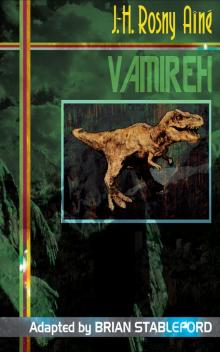 Vamireh
Vamireh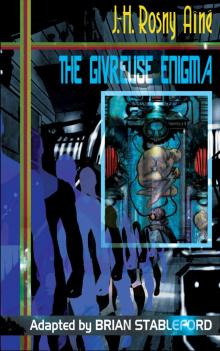 The Givreuse Enigma
The Givreuse Enigma Three Science Fiction Novellas: From Prehistory to the End of Mankind
Three Science Fiction Novellas: From Prehistory to the End of Mankind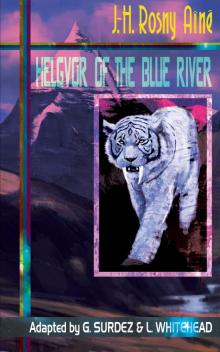 Helgvor of the Blue River
Helgvor of the Blue River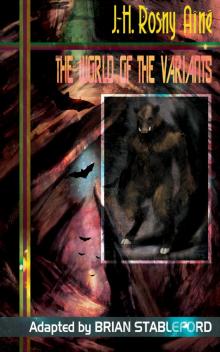 The World of the Variants
The World of the Variants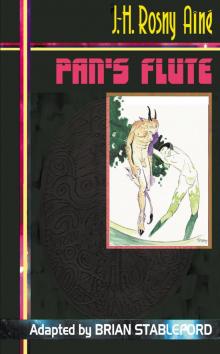 Pan's Flute
Pan's Flute The Navigators of Space
The Navigators of Space The Mysterious Force
The Mysterious Force